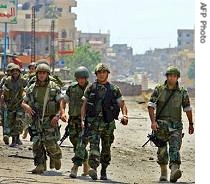2007年VOA标准英语-Fighting Rages in Lebanon for Third Day(在线收听)
Cairo
22 May 2007
Fighting between the Lebanese army and an Islamic extremist group raged on for a third day in a Palestinian refugee camp in north Lebanon. At least 66 people are reported killed since the battles began Sunday, but some estimates put the death toll much higher. A brief ceasefire allowed aid agencies to get assistance to camp residents for the first time, but a U.N. aid worker was wounded when the convoy came under fire. Later, thousands of civilians started fleeing camp, taking advantage of a lull in the fighting late Tuesday. VOA correspondent Challiss McDonough has details from our Middle East bureau in Cairo.
 |
| Lebanese special brigades patrol a street inside the Palestinian refugee camp of Nahr al-Bared in north Lebanon, 22 May 2007 |
On the third day of heavy fighting, militants from the Fatah al-Islam group announced a unilateral ceasefire at mid-afternoon. Some residents of the Nahr al-Bared camp, who had been anxiously sheltering in their homes, seized the opportunity to flee. Aid groups scrambled to try to get assistance into the Palestinian refugee camp. But, in less than an hour, the truce fell apart and the gunfire and shelling started again.
A United Nations official said a U.N. convoy carrying food and medicine came under fire. A number of U.N. aid workers were stranded inside the camp as the trucks retreated.
There was more fighting in the port city of Tripoli, near the refugee camp, where one of the Fatah al-Islam militants blew himself up during a raid by security forces. There were no casualties other than the bomber.
A spokeswoman for the International Committee of the Red Cross, Virginia de la Guardia, said she is concerned about the civilians who remain trapped in the camp.
"So, we are very concerned about the situation of the people who are inside, lacking of water, lacking of medicines, lacking of electricity," she said. "So, our main concern, what we are really asking, is that they facilitate access to the humanitarian organizations to bring relief."
There are some 30,000 people who live in the Nahr al-Bared camp, which is outside Tripoli. The army has so far not entered the camp itself. Palestinian refugee camps have been off-limits to Lebanese authorities since 1969 under an international agreement.
Human rights groups have criticized the Lebanese army for using artillery to target such a heavily populated area. They say it is nearly impossible to avoid civilian casualties.
Scores of Palestinian refugees in two other camps marched through the streets and burned tires in protest against the army's shelling of Nahr al-Bared. That fueled concerns that the violence could spread to other parts of the country.
Druze leader Walid Jumblatt, a member of the parliament's majority coalition, urged the country's divided politicians to unite in support of the army, despite their political differences. He also called on mainstream Palestinian factions to take action against Fatah al-Islam.
"It is the responsibility of the state, the army and the responsibility of the Palestinian organizations to stop sheltering [this group], either politically or physically," he said. "Hamas and Fatah should hand over this criminal gang that has no relationship with the Palestinian cause."
All mainstream Palestinian groups have disavowed Fatah al-Islam, saying they want nothing to do with the group's al-Qaida-inspired ideology. The Lebanese government has accused Fatah al-Islam of loyalty to Syria. But Syrian officials have strongly denied any ties to the group, and say its leader was imprisoned in Damascus over his extremist views.
In Washington, White House spokesman Tony Snow read a statement of support for the Lebanese government as it "faces down the threat of terrorism and political violence."
Druze leader Jumblatt also told reporters he expects more bombings in Beirut, where two large bombs have exploded since Sunday, one in a Christian neighborhood and the other in an upscale shopping district. Fatah al-Islam leaders have denied responsibility for those attacks.